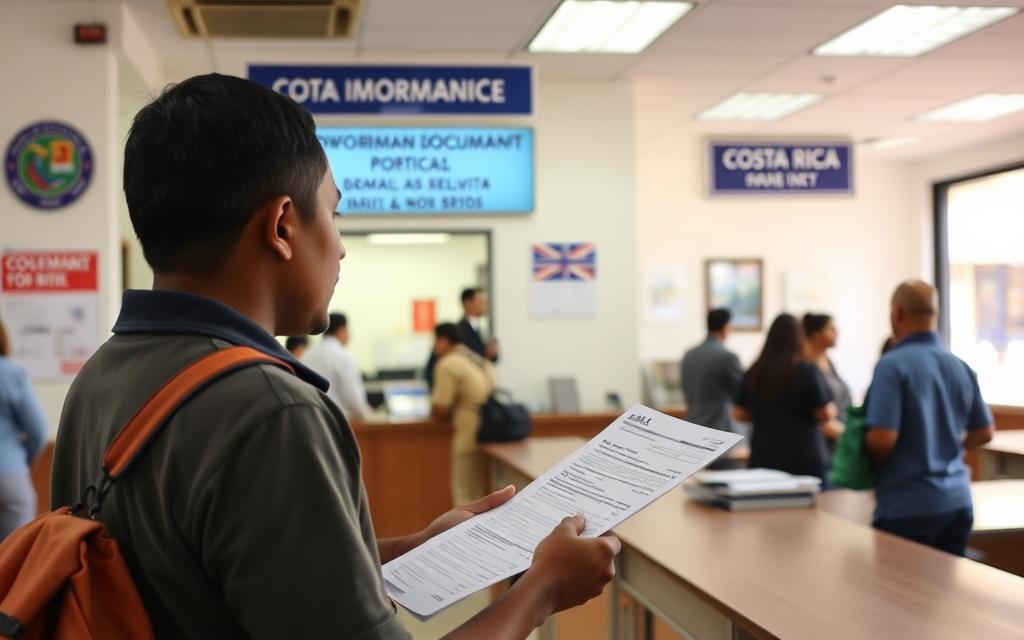As a hub for international workers and service providers, Costa Rica has introduced Law No…

Can you work remotely in Costa Rica with residency? We Can Help
Costa Rica has become a haven for digital nomads and remote workers, thanks to its stunning landscapes and vibrant culture. At Costa Rica Immigration Experts (CRIE), we have helped numerous clients achieve their dream of living in this beautiful country.
With over 20 years of experience and thousands of successful residencies, we understand the intricacies of Costa Rican immigration law. As the immigration landscape evolves, understanding the legal requirements for remote work is crucial.
We will explore the intersection of residency status and remote work authorization, discussing various residency options and their requirements. Our expertise will guide you through the process, ensuring a smooth transition to your new life in Costa Rica.
Understanding Remote Work in Costa Rica
As the world embraces remote work, Costa Rica stands out as an ideal destination for digital nomads. The country’s unique blend of natural beauty, cultural richness, and modern infrastructure makes it an attractive place for remote professionals.
The Rise of Digital Nomads in Costa Rica
Costa Rica has emerged as a premier destination for digital nomads seeking a balance between productive work and tropical living. The digital nomad community in Costa Rica has grown exponentially, creating vibrant hubs in areas like San José, Tamarindo, and Santa Teresa. For more information on the digital nomad visa in Costa Rica, you can visit this link.
The country’s stable political environment and growing infrastructure supporting remote professionals have contributed to its popularity. The community’s growth has led to the development of various coworking spaces and networking opportunities, making it easier for remote workers to connect and collaborate.
Benefits of Working Remotely from Costa Rica
Working remotely from Costa Rica offers numerous benefits, including improved work-life balance, access to outdoor activities year-round, and the opportunity to immerse yourself in the country’s rich “Pura Vida” culture. Costa Rica’s time zone alignment with North America makes it particularly attractive for remote workers who need to maintain regular communication with US-based companies or clients.
- Costa Rica’s tropical climate allows for year-round outdoor activities, enhancing the overall quality of life.
- The country’s cultural richness provides a unique and inspiring environment for creative professionals.
- The Costa Rican government’s efforts to attract digital nomads have resulted in policies that make the country more accessible to remote workers.
Costa Rica Residency Options for Remote Workers
As a haven for digital nomads, Costa Rica has established multiple residency categories that cater to different professional and personal circumstances. This flexibility makes it an attractive destination for remote workers worldwide.
Temporary Residency Categories
Costa Rica offers several temporary residency categories that can accommodate remote workers. The Rentista program is one such option, requiring applicants to prove a monthly income of at least $2,500 for a specified period.
The Pensionado program is another category, designed for retirees with a pension income. This program offers various benefits, including discounts on healthcare and other services.
For those looking to invest in Costa Rica, the Inversionista program is available, requiring a minimum investment of $200,000 in a business or real estate.
Permanent Residency Pathways
After maintaining temporary residency status for three consecutive years, remote workers can apply for permanent residency. This status provides more stability and reduces the need for frequent renewals.
The process for obtaining permanent residency involves submitting additional documentation and meeting specific requirements, such as demonstrating a connection to Costa Rica and fulfilling tax obligations.
It’s essential for applicants to understand the distinct requirements and benefits associated with each residency category to make an informed decision about their residency pathway.
Costa Rica’s residency options are designed to be inclusive, offering various pathways for remote workers to live and work in the country legally. By choosing the right category, individuals can enjoy the country’s rich culture and natural beauty while maintaining their professional careers.
The Digital Nomad Visa: A Game Changer
The Digital Nomad Visa is a game-changing initiative by Costa Rica, catering to the growing demographic of remote workers worldwide. Introduced in 2022, this visa category has opened up new avenues for individuals looking to live and work in Costa Rica.
Requirements and Application Process
To be eligible for the Digital Nomad Visa, applicants must meet specific requirements. They need to demonstrate a stable monthly income of at least $3,000 for individuals or $4,000 for families, supported by financial statements. The application process involves submitting a valid passport, proof of income, health insurance coverage for the duration of stay, and paying a $100 application fee.
The application process is designed to be straightforward, allowing applicants to efficiently navigate the requirements and submit their applications.
Benefits and Limitations
The Digital Nomad Visa offers several benefits, including income tax exemption on foreign-earned income during the stay in Costa Rica, exemption from import taxes on necessary work equipment, and the ability to use a foreign driver’s license. Additionally, visa holders can open a savings account in Costa Rica, facilitating their financial management while residing in the country.
While the visa provides a one-year stay that can be extended for an additional year, applicants must have stayed in Costa Rica for at least 180 days to qualify for the extension. This requirement ensures that visa holders integrate into the local community and make the most of their experience in Costa Rica.
Can You Work Remotely in Costa Rica with Residency?

For those looking to work remotely in Costa Rica, having residency is just the first step; understanding the legal and tax landscape is equally important. As we explore the possibilities and limitations, it’s clear that Costa Rica offers a unique blend of opportunities for remote workers.
Legal Framework for Remote Work
The legal framework for remote work in Costa Rica is nuanced. Under Costa Rican law, most residency categories permit remote work for foreign employers or clients, as this activity doesn’t directly impact the local labor market or compete with Costa Rican workers. The distinction lies in the type of employment: working for a Costa Rican entity requires a work permit, while remote work for foreign companies is generally allowed.
Temporary residents can usually work remotely for companies outside Costa Rica without needing additional permits. However, those wishing to work for local companies must obtain specific work authorization. This framework allows for flexibility while protecting the local job market.
- Most residency categories allow remote work for foreign employers.
- Temporary residents can work for foreign companies without additional permits.
- Working for local companies requires specific work authorization.
Tax Implications for Remote Workers
Tax implications for remote workers in Costa Rica vary based on residency status. Holders of the Digital Nomad Visa enjoy complete exemption from Costa Rican income tax on foreign earnings. Other residents may face different tax obligations, making it crucial to understand one’s tax status.
Permanent residents have greater flexibility regarding employment options, including working for local businesses or establishing their own companies within Costa Rica. It’s advisable for remote workers to consult with tax professionals familiar with both Costa Rican tax law and their home country’s regulations to ensure compliance with all tax obligations.
For more detailed information on navigating Costa Rica’s immigration and residency processes, we recommend visiting our Costa Rica Immigration Expert Services Overview page.
The Residency Application Process

Costa Rica’s residency application process is a multi-stage pathway that requires attention to detail and timely submission of documents. Understanding the steps involved can significantly simplify the journey for applicants.
Required Documentation
The residency application process in Costa Rica follows a structured pathway that begins with document preparation and submission through the official immigration channels. Required documentation typically includes a valid passport, birth certificate, police clearance from your home country, proof of financial means, and specific forms related to your chosen residency category.
All documents from outside Costa Rica must be properly authenticated through either an apostille or consular legalization. Non-Spanish documents require official translation by a certified Costa Rican translator. Important documents also include a legalized or authenticated birth certificate, no older than six months, and a valid police record, not more than six months old.
Timeline and Expectations
The timeline for residency approval varies significantly, with most applications taking between 4-12 months from submission to final approval, depending on the complexity of your case and current processing volumes. During the waiting period, applicants receive a provisional document that allows them to remain legally in Costa Rica and, in some cases, engage in specific activities including remote work.
For more detailed information on the Costa Rica residency application process, you can visit our page on the Costa Rica Residency Application Process. Working with experienced immigration experts can significantly streamline the process by ensuring proper document preparation and maintaining effective communication with immigration authorities throughout the application period.
Living in Costa Rica as a Remote Worker

Living in Costa Rica as a remote worker can be a dream come true, with its lush landscapes and welcoming communities. As we consider making Costa Rica our base, we need to explore the various aspects that make it an ideal or challenging destination for digital nomads.
Best Locations for Digital Nomads
Costa Rica offers a diverse range of locations that cater to the different preferences and needs of remote workers. Towns like Tamarindo and Santa Teresa are popular for their relaxed vibe, beautiful beaches, and fun activities, making them perfect for balancing work and play.
- San José and its surrounding Central Valley provide the most developed infrastructure and reliable internet connectivity.
- Coastal areas like Tamarindo, Nosara, and Santa Teresa have become digital nomad hotspots.
- Mountain retreats offer a serene environment for those seeking a more secluded lifestyle.
For more information on how to legally work from Costa Rica, you can visit this resource.
Cost of Living and Quality of Life
The cost of living in Costa Rica varies significantly depending on the location. Coastal spots can be pricier, with costs ranging from $500 to $2,000 a month, depending on our lifestyle.
- Urban areas generally offer more affordable housing options.
- Beach communities command premium prices, especially during high tourist seasons.
- Costa Rica’s excellent healthcare system, abundance of fresh food, and outdoor recreation opportunities enhance the quality of life.
The “Pura Vida” lifestyle promotes a healthy work-life balance, making Costa Rica an attractive destination for remote workers. By choosing the right location and understanding the local cost of living, we can enjoy a high quality of life in this beautiful country.
Common Challenges and How to Overcome Them
Despite its many advantages, working remotely in Costa Rica presents several common challenges that require careful navigation. As digital nomads, we must be aware of these obstacles to ensure a smooth transition to life and work in this beautiful country.
Navigating Bureaucracy
Navigating Costa Rican bureaucracy is one of the most significant challenges for remote workers. Government processes often move at a different pace than many foreigners are accustomed to, and language barriers can complicate administrative procedures.
Many official documents and communications are exclusively in Spanish, making professional translation services valuable for non-Spanish speakers. Banking can also present hurdles, with account opening procedures sometimes requiring residency status.
- Understanding the legal requirements for remote work in Costa Rica is crucial.
- Language barriers can be overcome with professional translation services.
- Banking procedures may require residency status, complicating financial management.
Maintaining Connectivity and Productivity
Maintaining connectivity and productivity is another significant challenge. Internet connectivity varies throughout Costa Rica, with urban areas offering reliable high-speed connections while rural locations may experience occasional outages or slower speeds.
The rainy season, which runs from May through November, can impact both connectivity and productivity, with occasional power outages requiring preparation such as backup power solutions and alternative work locations.
- Urban areas generally offer reliable internet, while rural areas may have slower speeds.
- Backup solutions are essential for maintaining productivity during outages.
- Cultural differences in business practices may require adjustments for remote workers.
How Costa Rica Immigration Experts Can Help
Navigating Costa Rica’s immigration system can be complex, but Costa Rica Immigration Experts are here to guide you through the process. With over 20 years of experience and thousands of successful residencies, we are one of the oldest and most trusted immigration firms in Costa Rica.
Our Experience and Expertise
Costa Rica Immigration Experts (CRIE) brings over two decades of specialized experience in navigating Costa Rica’s complex immigration system, having successfully processed thousands of residency applications for clients from around the world. Our team of bilingual immigration specialists maintains close relationships with government officials and stays continuously updated on the latest regulatory changes, ensuring your application reflects current requirements.
We provide comprehensive document preparation services, including detailed checklists of required materials, verification of document authenticity, and coordination of necessary translations and certifications.
Personalized Consultation and Services
Our personalized consultation process begins with a thorough assessment of your specific situation to determine the most appropriate residency category based on your financial situation, future plans, and personal circumstances. We handle all interactions with immigration authorities on your behalf, including document submission, status inquiries, responding to requests for additional information, and coordinating appointment schedules.
Throughout the application process, we provide regular updates on your case status and realistic timelines based on current processing volumes and our extensive experience with similar applications. Our services extend beyond initial approval, including assistance with residency renewals, status changes (such as transitioning from temporary to permanent residency), and addressing any compliance issues that may arise during your time in Costa Rica.
Conclusion
As we’ve explored throughout this article, Costa Rica offers a unique blend of natural beauty and progressive policies for remote workers. Working remotely in Costa Rica with residency is not only possible but increasingly common, thanks to the country’s evolving immigration policies and improved infrastructure.
The Digital Nomad Visa and traditional residency categories provide viable pathways for remote workers to legally establish themselves in Costa Rica. Understanding the distinctions between these options is crucial, as each carries specific requirements and benefits.
For personalized guidance on your specific situation, we invite you to contact Costa Rica Immigration Experts for a consultation. Our experienced team can help navigate bureaucratic complexities and streamline your transition to living and working in Costa Rica. Please call or WhatsApp us at +506 8706-3888, +506 8373 2085, or +1 305-906-6784 for more information.


